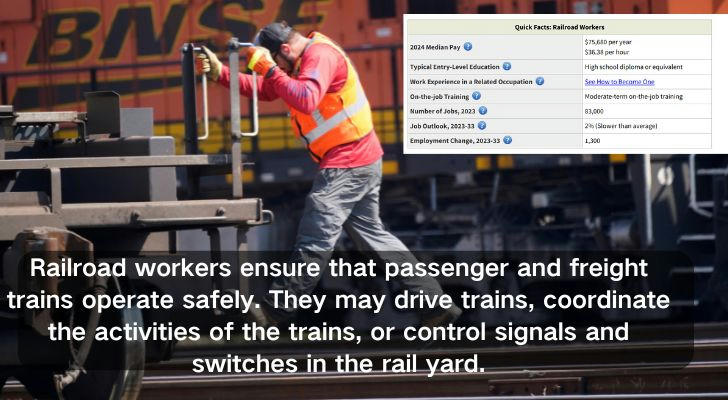High-Paying Railroad Worker Jobs with No Experience Required: Start Your Career Today!
Many railroad workers have worked in the industry for decades.The following information can help you find the most in-demand railroad worker jobs near you.

Who Are Railroad Workers?
Railroad workers fill a variety of essential roles, such as:
- Locomotive Engineers: Operate trains, controlling speed and routes to ensure safe travel.
- Track and Equipment Maintenance Workers: Inspect, repair, and maintain rails and infrastructure.
- Signal Operators and Dispatchers: Manage signal systems and train schedules for safe train spacing.
- Safety Inspectors: Enforce safety standards on the job site.
Together, these roles ensure that trains arrive on time and operate safely.
Salary and Benefits – A Major Attraction
According to the Association of American Railroads (AAR), railroad workers enjoy some of the highest compensation packages in the U.S.:
- Total annual compensation including benefits ranges from $135,000 to $190,000, with an average around $160,000—significantly above the national average wage.
- Comprehensive benefits include health insurance, retirement plans, and paid time off.
- Employees stay an average of nearly 14 years, demonstrating strong job stability.
- About 80% of railroad workers are union members, benefiting from collective bargaining agreements that raised wages by an average of 24% between 2020 and 2024.
This combination of high pay and solid benefits makes railroad work an attractive career choice.
Safety and Training
Railroad work is among the safest industries in America. Injury rates for railroad workers are substantially lower than in retail and many other sectors, and recent years have seen a steady decline in workplace accidents. Companies invest heavily in safety training and technology such as simulator-based training and automated signaling systems to protect employees.
New hires undergo thorough training covering safety procedures, mechanical operations, and signal management to ensure they are fully prepared.
Career Diversity and Growth Opportunities
Railroad jobs are not limited to driving trains and track work. The industry also employs professionals in:
- Environmental compliance
- IT support
- Simulation software development
- Fuel efficiency management
Railroad careers often run in families, reflecting a strong tradition and sense of community. The industry also welcomes veterans, who make up about one in six railroad employees, bringing discipline and teamwork skills well suited to rail work.
Economic Impact
Each railroad job supports approximately 3.9 related jobs across manufacturing, logistics, technology, and service industries, making rail employment a major driver of the U.S. economy.
How to Become a Railroad Worker
Steps to enter the railroad workforce:
- Be at least 18 years old with a high school diploma or equivalent.
- Choose a position that fits your interests, such as engineer, maintenance worker, or dispatcher.
- Search for job openings on major railroad company websites (e.g., Norfolk Southern, Union Pacific).
- Enroll in company-provided training programs covering safety and job skills.
- Prepare a resume highlighting relevant skills and teamwork abilities, and pass interviews.
- Continue learning on the job with opportunities for promotion.
Real-Life Example: Joe Wilson’s Career Path
Joe Wilson has worked at Norfolk Southern Railway for over 21 years. Starting as a track maintenance worker, he completed company training programs and steadily advanced to become a senior locomotive engineer.
Joe shares, “Railroad work has given me a stable, well-paying career with excellent benefits. It’s a job I’m proud of, and it has allowed me to provide for my family while growing professionally.”
His story highlights the long-term career growth and security that the railroad industry offers.
Conclusion
Railroad workers enjoy high salaries, comprehensive benefits, job stability, and diverse career opportunities. Backed by strong safety standards and training programs, the railroad industry is an excellent career choice for job seekers looking for long-term success.
